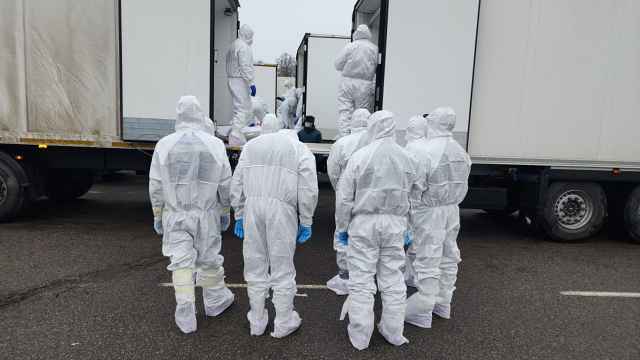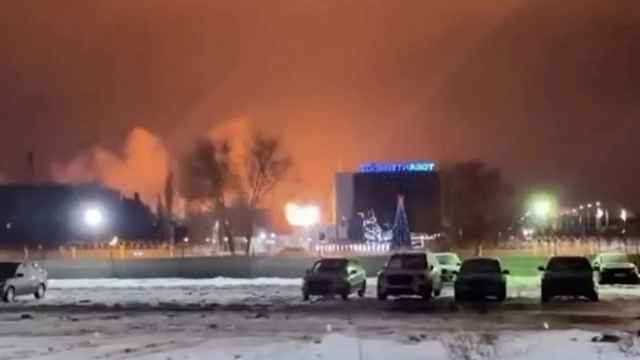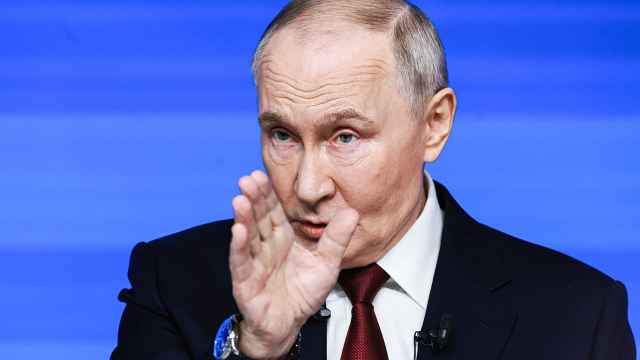Severstal and Evraz Group, Russia's top two steelmakers, are outperforming their largest competitors in Asia and Europe as a drive by Prime Minister Vladimir Putin to expand manufacturing boosts domestic demand for car parts, rail track and pipelines.
Severstal opened two plants near Moscow in the third quarter to supply automakers including Peugeot and Volkswagen, who are setting up assembly lines in Russia as sales rise. The steelmaker's shares have soared 80 percent in Moscow trading this year, compared with a 42 percent slump for Hebei Iron & Steel, the listed unit of China's biggest producer.
Selling higher-grade metal at home rather than exporting semi-finished steel offers bigger profits for Severstal and its Russian peers, after a jump in Chinese output and a weakening global economy dragged down prices from 2008 highs. Russian producers are benefiting from fewer export expenses and higher domestic consumption as Putin spearheads a $1 trillion infrastructure boom to diversify the economy.
"Investors now are more interested in Russian steel companies' exposure to a vibrant domestic market than their overseas ambitions," said Alexander Pukhayev, an analyst at VTB Capital. "The shift to high-value products sold in Russia is one of the cornerstones of the investment case today."
Russia's five biggest steelmakers will see earnings before interest, tax, depreciation and amortization more than triple on average from 2009 to 2012, according to analysts surveyed by Bloomberg.
Evraz climbed to the highest price in five months in London trading Friday after raising its forecast for third-quarter EBITDA to as much as $600 million, from as low as $480 million previously.
Higher-value products sold domestically can earn three times as much profit as semi-finished exports, said Boris Krasnozhenov, an analyst at Renaissance Capital. Steel-slab sales contribute an average $100 a metric ton to steelmakers' EBITDA, while galvanized steel or thick plates earn $300 a ton, he said. Galvanized steel is used in cars to prevent corrosion.
"The government has made this part of their strategy for Russia's next phase of development," said Chris Weafer, chief strategist at UralSib Capital. "Moving up the value chain in areas where Russia is already established is easier and quicker to show results than trying to bring in new industries."
Russia was the fourth-biggest steel producer last year, behind China, Japan and India, according to the World Steel Association.
The country has offered tax breaks to foreign carmakers on condition that they buy a percentage of their parts from Russian suppliers, a requirement the government may raise to 60 percent from 30 percent. That may deter some overseas manufacturers, according to Eurasia Group.
"The risk is that future foreign investors in the Russian car industry will balk at higher localization, investment and production requirements, and elect not to enter the market at all — while those already involved may find themselves at a sharp disadvantage," said Alex Brideau, an analyst at the New York-based research company.
Automakers that decide to take the risk and expand in Russia are set to benefit from a recovery in its car sales, forecast to rise by almost 15 percent this year to 1.67 million units, according to the Association of European Businesses.
That rebound is fueled by an economic recovery that's projected to outpace growth in North America and Europe. Russia has forecast 4 percent growth this year and 4.2 percent in 2011. The comparable figure in the United States is a 2.5 percent expansion next year and 1.4 percent in the euro zone, according to a Bloomberg survey of economists.
Russia's investment in high-grade automotive steel is "a whole new phase for the country's car industry," Putin said during a July visit to Magnitogorsk Iron & Steel Works, Russia's fourth-biggest steelmaker.
Magnitogorsk, or MMK, will spend $3 billion over three years to boost output capacity by 60 percent, it said Sept. 16. The company will raise the proportion of higher-value products to 50 percent from 35 percent over the period, as Russian demand for automotive steel will triple over the next decade, MMK said Oct. 1, citing World Steel Association data.
Severstal increased its proportion of Russian sales to 37 percent of revenue in the first half from 31 percent a year earlier. Evraz, which is upgrading a plant in the Ural Mountains to make high-speed rail track, raised domestic sales to 33 percent from 28 percent. Both are likely to get about 45 percent of their sales from Russia in 2012, according to Renaissance Capital.
Putin's strategy to shift the economy away from dependence on raw materials goes across commodity classes. He's urged oil companies to refine more crude and export gasoline and petrochemicals, while timber producers have built wood-processing and pulp mills in Russia after export tariffs rose.
The government's 10-year infrastructure investment plan includes spending on railways, roads, airports and ports, as well as pipelines for gas and oil, the country's biggest export earner.
"Domestic steel producers will be utilizing their full capacity, and demand will be strong," said Timur Salikhov, an analyst at Morgan Stanley in Moscow. Mechel, a coal and steel producer, and Evraz will be "two key beneficiaries" of the construction recovery, he said.
Evraz and Mechel are investing a combined $1.1 billion in two plants to make rail track, anticipating an increase in orders from Russian Railways, operator of the world's largest railroad network.
"Selling semi-finished products abroad isn't particularly profitable," said MMK's chief financial officer Oleg Fedonin. "Growth prospects in Russia are significantly higher."
A Message from The Moscow Times:
Dear readers,
We are facing unprecedented challenges. Russia's Prosecutor General's Office has designated The Moscow Times as an "undesirable" organization, criminalizing our work and putting our staff at risk of prosecution. This follows our earlier unjust labeling as a "foreign agent."
These actions are direct attempts to silence independent journalism in Russia. The authorities claim our work "discredits the decisions of the Russian leadership." We see things differently: we strive to provide accurate, unbiased reporting on Russia.
We, the journalists of The Moscow Times, refuse to be silenced. But to continue our work, we need your help.
Your support, no matter how small, makes a world of difference. If you can, please support us monthly starting from just $2. It's quick to set up, and every contribution makes a significant impact.
By supporting The Moscow Times, you're defending open, independent journalism in the face of repression. Thank you for standing with us.
Remind me later.





